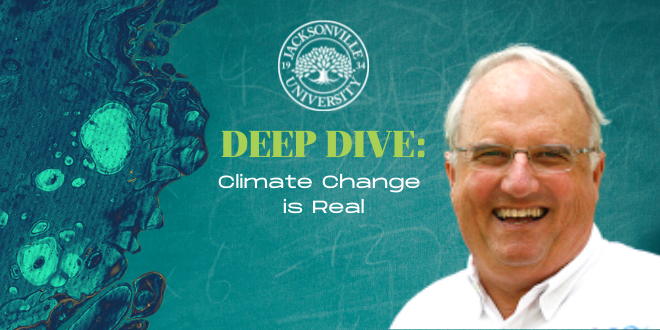Climate change is real. The impact is becoming more and more evident as time goes on. The impact to the St. Johns River is of great concern to a number of people. It is a shame that our political leaders have failed to grasp the significance for so long.
Rising sea levels, global warming and shifts in seasonal weather patterns are starting to affect our quality of life. Who cannot feel for our friends in California with the droughts and resulting wildfires, or the families along the Gulf Coast who suffer from what seems like an unending stream of hurricanes?
The recent storm events in the Northeast are not unprecedented, but are certainly unexpected. And these are just the impacts in the U.S. There is a worldwide shift in weather patterns that is changing the landscape. When we look at the global picture, there is a certain balance to what is happening. Droughts in one area are typically accompanied by excess rain in another. Everything has to be someplace, as a former professor used to say.
Locally we have seen a gradual shift in weather patterns. We joke about the new normal, but the facts are that the old statement has never been truer: the only constant is change. Weather is what is happening today and tomorrow. While climate is the cumulative summation. It’s the pattern we see developing every day that ultimately results in the long-term picture. Along the way, there are both “natural” and “anthropogenic” (human-induced) factors that contribute to climate change.
Locally we have seen rainfall over the last several years total a little over the normal 52 inches a year. A decade ago, we were not seeing normal rainfall and had more drought-like conditions. Hurricane Irma in 2017 dumped a huge amount of water on Florida, and the St. Johns River received a large part of that rainfall. The impact on the salinity and estuarine nature of the St. Johns was dramatic. But according to the National Weather Service, even Irma didn’t break the 1947 record of 82 inches a year. By contrast, 1927 saw the lowest rainfall with 30 inches.
Part of the problem that people have in understanding climate, is that we live in the now and really don’t remember details about the weather over the last several decades. Weather is highly variable. Our brains are just not wired to process long-term data sets. So, when we see and hear a phrase like climate change, we find it hard to comprehend.
It is equally troubling to think that how we live as individuals may affect the world’s climate. There is significant evidence that our way of life is the major contributing factor to the changing climate. And we do not want to give up our cars, air conditioning and beautiful lawns.
To compound the problem, the rest of the world wants what we have too.
There is no simple answer, but it is clear that something has to be done. We can each do our part by taking care of our own little mess. Try to reduce your energy and water consumption, look for ways to use less, and be smart about how we leave this world to our grandchildren.
Glad you asked River Life.
Are we having a harmful algae bloom in the St. Johns River this summer?
Yes, regretfully the combination of heavy rainfall, warm weather and excess nutrients have made conditions favorable for a blue-green algae outbreak. If you are walking along the river, or if you are on a boat in the river, you can probably see it floating in the water. It looks like small, green flakes in the water. These species of algae float near the surface and are highly susceptible to the wind. So, if wind is blowing off the water towards you, then you are more likely to see the algae. Be careful around the water. Don’t let your pets or children play in the water if you see algae present. Avoid eating fish caught in the river with visible algae unless you wash and clean them thoroughly.
River Life runs the first Tuesday of each month in The Florida Times-Union. E-mail Quinton White, executive director of Jacksonville University’s Marine Science Research Institute, with questions about our waterways at qwhite@ju.edu. For more on the MSRI, visit ju.edu/msri.
 Wave Magazine Online Jacksonville University News Hub
Wave Magazine Online Jacksonville University News Hub
